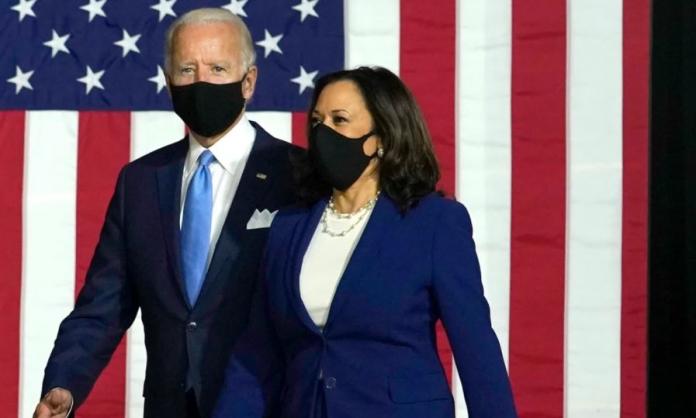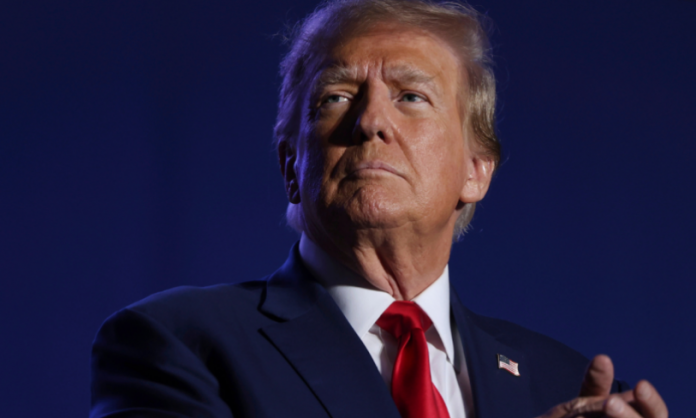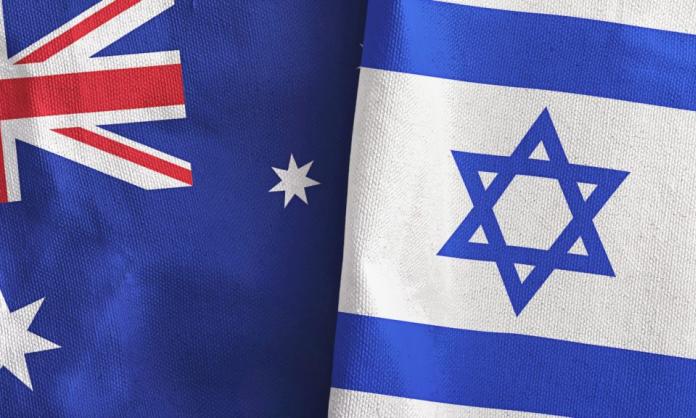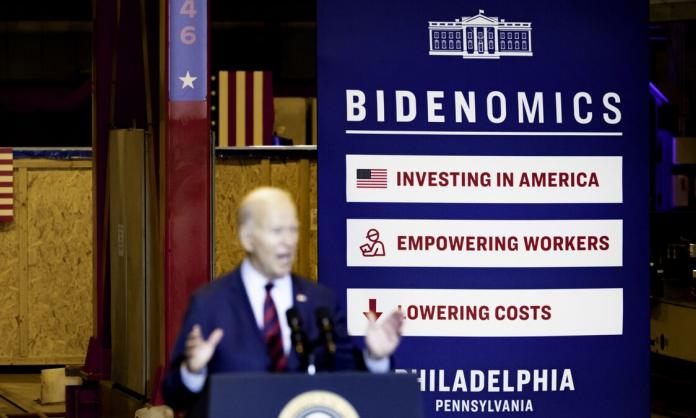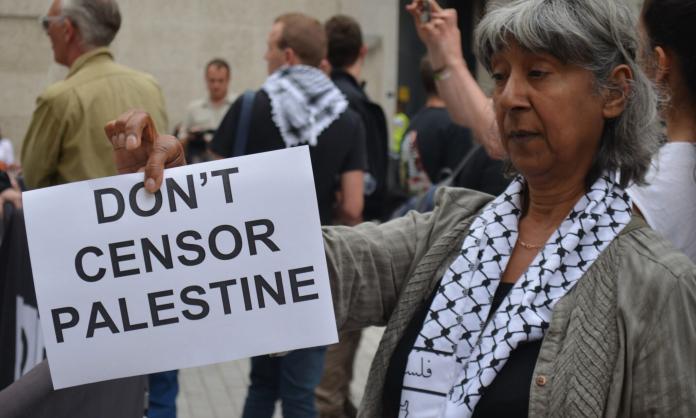One thousand people per day dying from COVID-19. Months of anti-racist protests and riots in cities across the country. A president, isolated and reviled, lashing out against any restraint upon his increasing authoritarianism. The divided Senate unable or unwilling to stop millions being driven into poverty by the biggest economic shock in decades. And the growing realisation that whatever remained of the American Dream seems to have exhausted itself, leaving devastation in its wake.
You would think that such a crisis would call forth a political opposition brimming with bold and radical proposals for the future of US society. That the comforting banalities of moderate liberalism would be so out of place as to warrant little more than a bemused shake of the head. That a new type of politics would emerge to chart a road out of the disastrous state of contemporary US capitalism. You could also imagine, if you were more than a little naive, Democratic Party policy rooms full of young idealists dissecting the structural inequalities of the system, hammering out the details of green new deals and plans for reparations, in an atmosphere of expectation for the national democratic regeneration about to burst forth.
Instead, the Democratic National Committee meetings must be more like a funeral home. The embalmer leans over the candidate and shifts his jowl slightly to the left. The director frowns and tells him to shift it back to the right. The gaggle of corporate donors and policy advisers crowd around the corpse, nodding their approval. The embalmer props up the body on the gurney. The director opens Biden’s milky eyes. In place of an insurgent opposition, we have the finally unveiled, but long predicted, Joe Biden-Kamala Harris presidential ticket.
Biden, dubbed “yesterday’s man” by some critics, offers voters humdrum platitudes such as, “We hold these truths to be self-evident. All men and women, created by, go, you know, you know—the thing”. Considering that Biden once supported racial segregation, it might not be so surprising that he struggled with the words.
More fundamentally, Biden is the perfect representative of the geriatric neoliberal patriarchs who sit at the top of the soulless machine that is the Democratic Party. It is not idealism that motivates them, but pure cynicism, profit and power. Two weeks after announcing a vaguely progressive joint policy taskforce to develop new corporate regulations, Biden bluntly told a fundraising event: “Corporate America has to change its ways. It’s not going to require legislation. I’m not proposing any”. He says this while 20 million jobs have evaporated and the country’s billionaires, despite the pandemic, have increased their collective wealth by $637 billion.
On the surface, Kamala Harris appears a vastly different politician, more attuned with the times. At least, the times before Black Lives Matter exploded onto the streets, drawing hundreds of thousands into mass protests against police brutality, racism and inequality. Like Biden, Harris wants to replicate Obama-era symbolism, although without having to rely upon the “one of my best friends is Black” trope. In reality, her selection as vice presidential candidate is a fitting denouement for the limits of the politics of representation. It’s not just that she was a police prosecutor who fought to keep innocent people in jail, persecuted the parents of wagging school children, withheld evidence to keep people in jail and argued for keeping non-violent offenders locked up as a source of cheap labour. It’s also that, just like Joe, she is a hardened defender of the corporate elite.
During her time as a “progressive prosecutor”, she overturned her own office’s plan to prosecute OneWest Bank, which was accused of pushing home owners out of foreclosed houses, illegally backdating documents and rigging foreclosure auctions. The bank is owned by current Trump Treasury Secretary Steve Mnuchin. Harris brings to the Biden campaign $40 million she had raised for her own White House bid, strong connections to the Californian wealthy from her prosecutor days and the backing of Silicon Valley millionaires who had been lukewarm on Biden.
In different ways, both Biden and Harris hark back to the Obama years, which can appear rather good compared to the current horror show of Trump. But if you pierce beneath the surface of the Obama era, you find that, faced with the 2008 global financial crisis, Obama bailed out the banks, and that both Occupy Wall Street and Black Lives Matter began under his presidency—and were confronted with an unsympathetic White House and repression from Democratic Party mayors. Behind the smokescreen of “saving the republic” and a “return to normal”, Biden and Harris are positioning themselves to continue the inequality and entrenchment of corporate power that characterised the Obama years. It is not surprising, then, that the corporate world has hailed the arrival of the Biden-Harris ticket. A Wall Street Journal article on 12 August summed up the mood:
“About half a dozen leaders in business and finance said they expect Ms. Harris to be a moderate voice committed to rebuilding an economy upended by the coronavirus pandemic. They expect her to take some swings at Wall Street; as California attorney general, she helped take big banks to task for their role in the foreclosure crisis, and she has proposed taxing financial transactions to pay for a health care overhaul. But they said they won’t take it personally.”
The wealthy welcome Biden and Harris not because they particularly object to all of Trump’s ugliness, but because he has thrown into question US capitalism’s legitimacy. A majority of the rich and powerful want the Democrats returned to the White House because they yearn for the moderate centrist politics that secured for them decades of unimaginable wealth without sharp social polarisation or the revolt of workers.
But is this a realistic expectation? The late sociologist Peter Mair once described the Western political elite as “ruling a void”, by which he meant that party-political structures and governments had become unmoored from the populations beneath them, whose desires they could not fathom. Today, they face not an empty void but one teeming with life—a heaving mass of discontented subjects questioning every decision they make and every lie they try to sell. The ruling class’s nightmare is that this mass will breach the boundaries of “acceptable” debate. They worry that Black Lives Matter might be only the beginning of a much bigger rebellion.
And worry they should. While many well-meaning left-wing people in the US will, grudgingly or otherwise, vote for the Democrats in November, the discontent that drove hundreds of thousands onto the streets is unlikely to disappear. Nor will the broader crisis of US society. Trump’s incompetence undoubtedly increased the fatal impact of the pandemic, but he did not create the country’s appalling private healthcare system—generations of Democrats and Republicans did. Trump has brought crony capitalism into the White House, but he didn’t oversee decades of corporate deregulation—the Democrats did. Trump is a vicious racist, but he wasn’t one of the elected politicians who constructed the modern prison-industrial complex—but Biden and Harris were. Trump has rattled sabres at Iran, North Korea and China—but Biden is arguably more committed to US imperial power, even while millions sink into poverty.
Last year during the mass protests in Hong Kong, one graffiti artist wrote: “There can be no returning to normal, because normal was the problem in the first place”. It’s something we should bear in mind as the US election draws closer.




